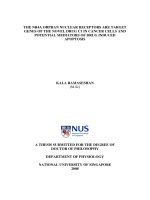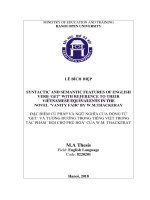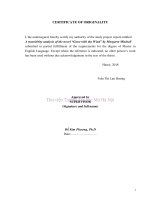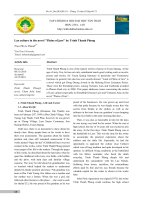THE NOVEL jennie gerhardt
Bạn đang xem bản rút gọn của tài liệu. Xem và tải ngay bản đầy đủ của tài liệu tại đây (1.4 MB, 338 trang )
TheProjectGutenbergEBookofJennieGerhardt,byTheodoreDreiser
ThiseBookisfortheuseofanyoneanywhereintheUnitedStatesandmost
otherpartsoftheworldatnocostandwithalmostnorestrictions
whatsoever.Youmaycopyit,giveitawayorre-useitunderthetermsof
theProjectGutenbergLicenseincludedwiththiseBookoronlineat
www.gutenberg.org.IfyouarenotlocatedintheUnitedStates,you'llhave
tocheckthelawsofthecountrywhereyouarelocatedbeforeusingthisebook.
Title:JennieGerhardt
Author:TheodoreDreiser
ReleaseDate:May29,2009[EBook#28988]
Lastupdated:January10,2020
Language:English
***STARTOFTHISPROJECTGUTENBERGEBOOKJENNIEGERHARDT***
ProducedbyJamesAdcock.SpecialthankstoTheInternet
Archive:AmericanLibraries,andProjectGutenbergAustralia
Jennie Gerhardt
ANOVEL
byTheodoreDreiser
AUTHOROF“SISTERCARRIE”,etc.
Copyright,1911,byHarper&Brothers
Copyright,1911,byBoni&Liveright,Inc.
PrintedintheUnitedStatesofAmerica
Contents
ChapterI
ChapterII
ChapterIII
ChapterIV
ChapterV
ChapterVI
ChapterVII
ChapterVIII
ChapterIX
ChapterX
ChapterXI
ChapterXII
ChapterXIII
ChapterXIV
ChapterXV
ChapterXVI
ChapterXVII
ChapterXVIII
ChapterXIX
ChapterXX
ChapterXXI
ChapterXXII
ChapterXXIII
ChapterXXIV
ChapterXXV
ChapterXXVI
ChapterXXVII
ChapterXXVIII
ChapterXXIX
ChapterXXX
ChapterXXXI
ChapterXXXII
ChapterXXXIII
ChapterXXXIV
ChapterXXXV
ChapterXXXVI
ChapterXXXVII
ChapterXXXVIII
ChapterXXXIX
ChapterXL
ChapterXLI
ChapterXLII
ChapterXLIII
ChapterXLIV
ChapterXLV
ChapterXLVI
ChapterXLVII
ChapterXLVIII
ChapterXLIX
ChapterL
ChapterLI
ChapterLII
ChapterLIII
ChapterLIV
ChapterLV
ChapterLVI
ChapterLVII
ChapterLVIII
ChapterLIX
ChapterLX
ChapterLXI
ChapterLXII
jenniegerhardt
CHAPTERI
One morning, in the fall of 1880, a middle-aged woman, accompanied by a
younggirlofeighteen,presentedherselfattheclerk’sdeskoftheprincipalhotel
inColumbus,Ohio,andmadeinquiryastowhethertherewasanythingaboutthe
placethatshecoulddo.Shewasofahelpless,fleshybuild,withafrank,open
countenanceandaninnocent,diffidentmanner.Hereyeswerelargeandpatient,
and in them dwelt such a shadow of distress as only those who have looked
sympatheticallyintothecountenancesofthedistraughtandhelplesspoorknow
anything about. Any one could see where the daughter behind her got the
timidity and shamefacedness which now caused her to stand back and look
indifferently away. She was a product of the fancy, the feeling, the innate
affection of the untutored but poetic mind of her mother combined with the
gravity and poise which were characteristic of her father. Poverty was driving
them. Together they presented so appealing a picture of honest necessity that
eventheclerkwasaffected.
“Whatisityouwouldliketodo?”hesaid.
“Maybeyouhavesomecleaningorscrubbing,”shereplied,timidly.“Icould
washthefloors.”
The daughter, hearing the statement, turned uneasily, not because it irritated
her to work, but because she hated people to guess at the poverty that made it
necessary.Theclerk,manlike,wasaffectedbytheevidenceofbeautyindistress.
Theinnocenthelplessnessofthedaughtermadetheirlotseemhardindeed.
“Waitamoment,”hesaid;and,steppingintoabackoffice,hecalledthehead
housekeeper.
Therewasworktobedone.Themainstaircaseandparlorhallwereunswept
becauseoftheabsenceoftheregularscrub-woman.
“Isthatherdaughterwithher?”askedthehousekeeper,whocouldseethem
fromwhereshewasstanding.
“Yes,Ibelieveso.”
“Shemightcomethisafternoonifshewantsto.Thegirlhelpsher,Isuppose?”
“Yougoseethehousekeeper,”saidtheclerk,pleasantly,ashecamebackto
thedesk.“Rightthroughthere”—pointingtoanear-bydoor.“She’llarrangewith
youaboutit.”
Asuccessionofmisfortunes,ofwhichthislittlescenemighthavebeencalled
the tragic culmination, had taken place in the life and family of William
Gerhardt, a glass-blower by trade. Having suffered the reverses so common in
thelowerwalksoflife,thismanwasforcedtoseehiswife,hissixchildren,and
himselfdependentforthenecessariesoflifeuponwhateverwindfalloffortune
themorningofeachrecurringdaymightbring.Hehimselfwassickinbed.His
oldestboy,Sebastian,or“Bass,”ashisassociatestransformedit,workedasan
apprentice to a local freight-car builder, but received only four dollars a week.
Genevieve, the oldest of the girls, was past eighteen, but had not as yet been
trainedtoanyspecialwork.Theotherchildren,George,agedfourteen;Martha,
twelve; William ten, and Veronica, eight, were too young to do anything, and
onlymadetheproblemofexistencethemorecomplicated.Theironemainstay
wasthehome,which,barringasix-hundred-dollarmortgage,thefatherowned.
He had borrowed this money at a time when, having saved enough to buy the
house,hedesiredtoaddthreeroomsandaporch,andsomakeitlargeenough
forthemtolivein.Afewyearswerestilltorunonthemortgage,buttimeshad
beensobadthathehadbeenforcedtouseupnotonlythelittlehehadsavedto
payofftheprincipal,buttheannualinterestalso.Gerhardtwashelpless,andthe
consciousnessofhisprecarioussituation—thedoctor’sbill,theinterestdueupon
the mortgage, together with the sums owed butcher and baker, who, through
knowinghimtobeabsolutelyhonest,hadtrustedhimuntiltheycouldtrustno
longer—all these perplexities weighed upon his mind and racked him so
nervouslyastodelayhisrecovery.
Mrs. Gerhardt was no weakling. For a time she took in washing, what little
shecouldget,devotingtheintermediatehourstodressingthechildren,cooking,
seeingthattheygotofftoschool,mendingtheirclothes,waitingonherhusband,
and occasionally weeping. Not infrequently she went personally to some new
grocer,eachtimefartherandfartheraway,and,startinganaccountwithalittle
cash, would receive credit until other grocers warned the philanthropist of his
folly.Cornwascheap.Sometimesshewouldmakeakettleoflyehominy,and
thiswouldlast,withscarcelyanythingelse,foranentireweek.Corn-mealalso,
whenmadeintomush,wasbetterthannothing,andthis,withalittlemilk,made
almostafeast.Potatoesfriedwasthenearesttheyevercametoluxuriousfood,
andcoffeewasaninfrequenttreat.Coalwasgotbypickingitupinbucketsand
basketsalongthemazeoftracksinthenear-byrailroadyard.Wood,bysimilar
journeys to surrounding lumber-yards. Thus they lived from day to day, each
hourhopingthatthefatherwouldgetwellandthattheglass-workswouldsoon
startup.ButasthewinterapproachedGerhardtbegantofeeldesperate.
“I must get out of this now pretty soon,” was the sturdy German’s regular
comment,andhisanxietyfoundbutweakexpressioninthemodestqualityofhis
voice.
ToaddtoallthistroublelittleVeronicatookthemeasles,and,forafewdays,
itwasthoughtthatshewoulddie.Themotherneglectedeverythingelsetohover
overherandprayforthebest.DoctorEllwangercameeveryday,outofpurely
humansympathy,andgravelyexaminedthechild.TheLutheranminister,Pastor
Wundt,calledtooffertheconsolationoftheChurch.Bothofthesemenbrought
an atmosphere of grim ecclesiasticism into the house. They were the blackgarbed,sanctimoniousemissariesofsuperiorforces.Mrs.Gerhardtfeltasifshe
were going to lose her child, and watched sorrowfully by the cot-side. After
threedaystheworstwasover,buttherewasnobreadinthehouse.Sebastian’s
wages had been spent for medicine. Only coal was free for the picking, and
severaltimesthechildrenhadbeenscaredfromtherailroadyards.Mrs.Gerhardt
thoughtofalltheplacestowhichshemightapply,anddespairinglyhituponthe
hotel.Now,byamiracle,shehadherchance.
“Howmuchdoyoucharge?”thehousekeeperaskedher.
Mrs.Gerhardthadnotthoughtthiswouldbelefttoher,butneedemboldened
her.
“Wouldadollaradaybetoomuch?”
“No,”saidthehousekeeper;“thereisonlyaboutthreedays’worktodoevery
week.Ifyouwouldcomeeveryafternoonyoucoulddoit.”
“Verywell,”saidtheapplicant.“Shallwestartto-day?”
“Yes; if you’ll come with me now I’ll show you where the cleaning things
are.”
The hotel, into which they were thus summarily introduced, was a rather
remarkablespecimenforthetimeandplace.Columbus,beingtheStatecapital,
andhavingapopulationoffiftythousandandafairpassengertraffic,wasagood
fieldforthehotelbusiness,andtheopportunityhadbeenimproved;soatleast
theColumbuspeopleproudlythought.Thestructure,fivestoriesinheight,and
ofimposingproportions,stoodatonecornerofthecentralpublicsquare,where
weretheCapitolbuildingandprincipalstores.Thelobbywaslargeandhadbeen
recentlyredecorated.Bothfloorandwainscotwereofwhitemarble,keptshiny
byfrequentpolishing.Therewasanimposingstaircasewithhand-railsofwalnut
and toe-strips of brass. An inviting corner was devoted to a news and cigarstand.Wherethestaircasecurvedupwardtheclerk’sdeskandofficeshadbeen
located,alldoneinhardwoodandornamentedbynovelgas-fixtures.Onecould
seethroughadooratoneendofthelobbytothebarbershop,withitschairsand
array of shaving-mugs. Outside were usually two or three buses, arriving or
departing,inaccordancewiththemovementofthetrains.
Tothiscaravanseraicamethebestofthepoliticalandsocialpatronageofthe
State.SeveralGovernorshadmadeittheirpermanentabidingplaceduringtheir
termsofoffice.ThetwoUnitedStatesSenators,wheneverbusinesscalledthem
toColumbus,invariablymaintainedparlorchambersatthehotel.Oneofthem,
Senator Brander, was looked upon by the proprietor as more or less of a
permanentguest,becausehewasnotonlyaresidentofthecity,butanotherwise
homelessbachelor.OtherandmoretransientguestsincludedCongressmen,State
legislators and lobbyists, merchants, professional men, and, after them, the
wholeraftofindescribableswho,comingandgoing,makeuptheglowandstir
ofthiskaleidoscopicworld.
Mother and daughter, suddenly flung into this realm of superior brightness,
felt immeasurably overawed. They went about too timid to touch anything for
fear of giving offense. The great red-carpeted hallway, which they were set to
sweep,hadforthemallthemagnificenceofapalace;theykepttheireyesdown
and spoke in their lowest tones. When it came to scrubbing the steps and
polishingthebrass-workofthesplendidstairsbothneededtosteelthemselves,
the mother against her timidity, the daughter against the shame at so public an
exposure. Wide beneath lay the imposing lobby, and men, lounging, smoking,
passingconstantlyinandout,couldseethemboth.
“Isn’titfine?”whisperedGenevieve,andstartednervouslyatthesoundofher
ownvoice.
“Yes,”returnedhermother,who,uponherknees,waswringingouthercloth
withearnestbutclumsyhands.
“Itmustcostagooddealtolivehere,don’tyouthink?”
“Yes,”saidhermother.“Don’tforgettorubintotheselittlecorners.Lookhere
whatyou’veleft.”
Jennie, mortified by this correction, fell earnestly to her task, and polished
vigorously,withoutagaindaringtolifthereyes.
Withpainstakingdiligencetheyworkeddownwarduntilaboutfiveo’clock;it
was dark outside, and all the lobby was brightly lighted. Now they were very
nearthebottomofthestairway.
Throughthebigswingingdoorsthereenteredfromthechillyworldwithouta
tall, distinguished, middle-aged gentleman, whose silk hat and loose military
cape-coatmarkedhimatonce,amongthecrowdofgeneralidlers,assomeone
of importance. His face was of a dark and solemn cast, but broad and
sympathetic in its lines, and his bright eyes were heavily shaded with thick,
bushy,blackeyebrows.Passingtothedeskhepickedupthekeythathadalready
beenlaidoutforhim,andcomingtothestaircase,startedup.
Themiddle-agedwoman,scrubbingathisfeet,heacknowledgednotonlyby
walking around her, but by graciously waving his hand, as much as to say,
“Don’tmoveforme.”
The daughter, however, caught his eye by standing up, her troubled glance
showingthatshefearedshewasinhisway.
Hebowedandsmiledpleasantly.
“Youshouldn’thavetroubledyourself,”hesaid.
Jennieonlysmiled.
Whenhehadreachedtheupperlandinganimpulsivesidewiseglanceassured
him,moreclearlythanbefore,ofheruncommonlyprepossessingappearance.He
noted the high, white forehead, with its smoothly parted and plaited hair. The
eyeshesawwereblueandthecomplexionfair.Hehadeventimetoadmirethe
mouth and the full cheeks—above all, the well-rounded, graceful form, full of
youth, health, and that hopeful expectancy which to the middle-aged is so
suggestiveofallthatisworthbeggingofProvidence.Withoutanotherlookhe
went dignifiedly upon his way, but the impression of her charming personality
wentwithhim.ThiswastheHon.GeorgeSylvesterBrander,juniorSenator.
“Wasn’t that a fine-looking man who went up just now?” observed Jennie a
fewmomentslater.
“Yes,hewas,”saidhermother.
“Hehadagold-headedcane.”
“Youmustn’tstareatpeoplewhentheypass,”cautionedhermother,wisely.
“Itisn’tnice.”
“Ididn’tstareathim,”returnedJennie,innocently.“Hebowedtome.”
“Well,don’tyoupayanyattentiontoanybody,”saidhermother.“Theymay
notlikeit.”
Jenniefelltohertaskinsilence,buttheglamorofthegreatworldwashaving
its effect upon her senses. She could not help giving ear to the sounds, the
brightness,thebuzzofconversationandlaughtersurroundingher.Inonesection
oftheparlorfloorwasthedining-room,andfromtheclinkofdishesonecould
tellthatsupperwasbeingprepared.Inanotherwastheparlorproper,andthere
someonecametoplayonthepiano.Thatfeelingofrestandrelaxationwhich
comes before the evening meal pervaded the place. It touched the heart of the
innocentworking-girlwithhope,forhersweretheyears,andpovertycouldnot
as yet fill her young mind with cares. She rubbed diligently always, and
sometimes forgot the troubled mother at her side, whose kindly eyes were
becoming invested with crows’ feet, and whose lips half repeated the hundred
caresoftheday.Shecouldonlythinkthatallofthiswasveryfascinating,and
wishthataportionofitmightcometoher.
Athalf-pastfivethehousekeeper,rememberingthem,cameandtoldthemthat
theymightgo.Thefullyfinishedstairwaywasrelinquishedbybothwithasigh
ofrelief,and,afterputtingtheirimplementsaway,theyhastenedhomeward,the
mother,atleast,pleasedtothinkthatatlastshehadsomethingtodo.
As they passed several fine houses Jennie was again touched by that halfdefinedemotionwhichtheunwontednoveltyofthehotellifehadengenderedin
herconsciousness.
“Isn’titfinetoberich?”shesaid.
“Yes,”answeredhermother,whowasthinkingofthesufferingVeronica.
“Didyouseewhatabigdining-roomtheyhadthere?”
“Yes.”
Theywentonpastthelowcottagesandamongthedeadleavesoftheyear.
“Iwishwewererich,”murmuredJennie,halftoherself.
“Idon’tknowjustwhattodo,”confidedhermotherwithalong-drawnsigh.
“Idon’tbelievethere’sathingtoeatinthehouse.”
“Let’s stop and see Mr. Bauman again,” exclaimed Jennie, her natural
sympathiesrestoredbythehopelessnoteinhermother’svoice.
“Doyouthinkhewouldtrustusanymore?”
“Let’stellhimwherewe’reworking.Iwill.”
“Well,”saidhermother,wearily.
Intothesmall,dimlylightedgrocerystore,whichwastwoblocksfromtheir
house, they ventured nervously. Mrs. Gerhardt was about to begin, but Jennie
spokefirst.
“Willyouletushavesomebreadto-night,andalittlebacon?We’reworking
nowattheColumbusHouse,andwe’llbesuretopayyouSaturday.”
“Yes,”addedMrs.Gerhardt,“Ihavesomethingtodo.”
Bauman,whohadlongsuppliedthembeforeillnessandtroublebegan,knew
thattheytoldthetruth.
“Howlonghaveyoubeenworkingthere?”heasked.
“Justthisafternoon.”
“Youknow,Mrs.Gerhardt,”hesaid,“howitiswithme.Idon’twanttorefuse
you. Mr. Gerhardt is good for it, but I am poor, too. Times are hard,” he
explainedfurther,“Ihavemyfamilytokeep.”
“Yes,Iknow,”saidMrs.Gerhardt,weakly.
Heroldshoddyshawlhidherroughhands,redfromtheday’swork,butthey
wereworkingnervously.Jenniestoodbyinstrainedsilence.
“Well,”concludedMr.Bauman,“Iguessit’sallrightthistime.Dowhatyou
canformeSaturday.”
Hewrappedupthebreadandbacon,and,handingJennietheparcel,headded,
withatouchofcynicism:
“WhenyougetmoneyagainIguessyou’llgoandtradesomewhereelse.”
“No,”returnedMrs.Gerhardt;“youknowbetterthanthat.”Butshewastoo
nervoustoparleylong.
Theywentoutintotheshadowystreet,andonpastthelowcottagestotheir
ownhome.
“Iwonder,”saidthemother,wearily,whentheynearedthedoor,“ifthey’ve
gotanycoal?”
“Don’tworry,”saidJennie.“Iftheyhaven’tI’llgo.”
“Amanrunusaway,”wasalmostthefirstgreetingthattheperturbedGeorge
offeredwhenthemothermadeherinquiryaboutthecoal.“Igotalittle,though.”
headded.“Ithrewitoffacar.”
Mrs.Gerhardtonlysmiled,butJennielaughed.
“HowisVeronica?”sheinquired.
“She seems to be sleeping,” said the father. “I gave her medicine again at
five.”
Whilethescantymealwasbeingpreparedthemotherwenttothesickchild’s
bedside,takingupanotherlongnight’svigilquiteasamatterofcourse.
While the supper was being eaten Sebastian offered a suggestion, and his
largerexperienceinsocialandcommercialmattersmadehispropositionworth
considering. Though only a car-builder’s apprentice, without any education
except such as pertained to Lutheran doctrine, to which he objected very
strongly,hewasimbuedwithAmericancolorandenergy.Histransformedname
ofBasssuitedhimexactly.Tall,athletic,andwell-featuredforhisage,hewasa
typicalstriplingofthetown.Alreadyhehadformulatedaphilosophyoflife.To
succeed one must do something—one must associate, or at least seem to
associate,withthosewhowereforemostintheworldofappearances.
For this reason the young boy loved to hang about the Columbus House. It
seemed to him that this hotel was the center and circumference of all that was
worthwhileinthesocialsense.Hewouldgodown-townevenings,whenhefirst
securedmoneyenoughtobuyadecentsuitofclothes,andstandaroundthehotel
entrance with his friends, kicking his heels, smoking a two-for-five-cent cigar,
preening himself on his stylish appearance, and looking after the girls. Others
weretherewithhim—towndandiesandnobodies,youngmenwhocamethereto
getshavedortodrinkaglassofwhisky.Andalloftheseheadmiredandsought
toemulate.Clotheswerethemaintouchstone.Ifmenworeniceclothesandhad
ringsandpins,whatevertheydidseemedappropriate.Hewantedtobelikethem
and to act like them, and so his experience of the more pointless forms of life
rapidlybroadened.
“Whydon’tyougetsomeofthosehotelfellowstogiveyoutheirlaundry?”he
asked of Jennie after she had related the afternoon’s experiences. “It would be
betterthanscrubbingthestairs.”
“Howdoyougetit?”shereplied.
“Why,asktheclerk,ofcourse.”
ThisplanstruckJennieasverymuchworthwhile.
“Don’tyoueverspeaktomeifyoumeetmearoundthere,”hecautionedhera
littlelater,privately.“Don’tyouletonthatyouknowme.”
“Why?”sheasked,innocently.
“Well,youknowwhy,”heanswered,havingindicatedbeforethatwhenthey
looked so poor he did not want to be disgraced by having to own them as
relatives.“Justyougoonby.Doyouhear?”
“Allright,”shereturned,meekly,foralthoughthisyouthwasnotmuchovera
yearhersenior,hissuperiorwilldominated.
Thenextdayontheirwaytothehotelshespokeofittohermother.
“Basssaidwemightgetsomeofthelaundryofthemenatthehoteltodo.”
Mrs. Gerhardt, whose mind had been straining all night at the problem of
addingsomethingtothethreedollarswhichhersixafternoonswouldbringher,
approvedoftheidea.
“Sowemight,”shesaid.“I’llaskthatclerk.”
When they reached the hotel, however, no immediate opportunity presented
itself.Theyworkedonuntillateintheafternoon.Then,asfortunewouldhaveit,
thehousekeepersentthemintoscrubupthefloorbehindtheclerk’sdesk.That
importantindividualfeltverykindlytowardmotheranddaughter.Helikedthe
former’ssweetlytroubledcountenanceandthelatter’sprettyface.Sohelistened
graciouslywhenMrs.Gerhardtventuredmeeklytoputthequestionwhichshe
hadbeenrevolvinginhermindalltheafternoon.
“Isthereanygentlemanhere,”shesaid,“whowouldgivemehiswashingto
do?I’dbesoverymuchobligedforit.”
Theclerklookedather,andagainrecognizedthatabsolutewantwaswritten
alloverheranxiousface.
“Let’ssee,”heanswered,thinkingofSenatorBranderandMarshallHopkins.
Bothwerecharitablemen,whowouldbemorethangladtoaidapoorwoman.
“YougoupandseeSenatorBrander,”hecontinued.“He’sintwenty-two.Here,”
headded,writingoutthenumber,“yougoupandtellhimIsentyou.”
Mrs.Gerhardttookthecardwithatremorofgratefulness.Hereyeslookedthe
wordsshecouldnotsay.
“That’s all right,” said the clerk, observing her emotion. “You go right up.
You’llfindhiminhisroomnow.”
With the greatest diffidence Mrs. Gerhardt knocked at number twenty-two.
Jenniestoodsilentlyatherside.
After a moment the door was opened, and in the full radiance of the bright
roomstoodtheSenator.Attiredinahandsomesmoking-coat,helookedyounger
thanattheirfirstmeeting.
“Well,madam,”hesaid,recognizingthecouple,andparticularlythedaughter,
“whatcanIdoforyou?”
Verymuchabashed,themotherhesitatedinherreply.
“We would like to know if you have any washing you could let us have to
do?”
“Washing?”herepeatedafterher,inavoicewhichhadapeculiarlyresonant
quality.“Washing?Comerightin.Letmesee.”
Hesteppedasidewithmuchgrace,wavedtheminandclosedthedoor.“Let
me see,” he repeated, opening and closing drawer after drawer of the massive
black-walnut bureau. Jennie studied the room with interest. Such an array of
nicknacks and pretty things on mantel and dressing-case she had never seen
before. The Senator’s easy-chair, with a green-shaded lamp beside it, the rich
heavycarpetandthefinerugsuponthefloor—whatcomfort,whatluxury!
“Sit down; take those two chairs there,” said the Senator, graciously,
disappearingintoacloset.
Stilloverawed,motheranddaughterthoughtitmorepolitetodecline,butnow
the Senator had completed his researches and he reiterated his invitation. Very
uncomfortablytheyyieldedandtookchairs.
“Isthisyourdaughter?”hecontinued,withasmileatJennie.
“Yes,sir,”saidthemother;“she’smyoldestgirl.”
“Isyourhusbandalive?”
“Whatishisname?”
“Wheredoeshelive?”
ToallofthesequestionsMrs.Gerhardtveryhumblyanswered.
“Howmanychildrenhaveyou?”hewenton.
“Six,”saidMrs.Gerhardt.
“Well,”hereturned,“that’squiteafamily.You’vecertainlydoneyourdutyto
thenation.”
“Yes, sir,” returned Mrs. Gerhardt, who was touched by his genial and
interestingmanner.
“Andyousaythisisyouroldestdaughter?”
“Yes,sir.”
“Whatdoesyourhusbanddo?”
“He’saglass-blower.Buthe’ssicknow.”
During the colloquy Jennie’s large blue eyes were wide with interest.
Whenever he looked at her she turned upon him such a frank, unsophisticated
gaze,andsmiledinsuchavague,sweetway,thathecouldnotkeephiseyesoff
ofherformorethanaminuteofthetime.
“Well,”hecontinued,sympathetically,“thatistoobad!Ihavesomewashing
herenotverymuchbutyouarewelcometoit.Nextweektheremaybemore.”
Hewentaboutnow,stuffingarticlesofapparelintoabluecottonbagwitha
prettydesignontheside.
“Doyouwanttheseanycertainday?”questionedMrs.Gerhardt.
“No,”hesaid,reflectively;“anydaynextweekwilldo.”
Shethankedhimwithasimplephrase,andstartedtogo.
“Letmesee,”hesaid,steppingaheadofthemandopeningthedoor,“youmay
bringthembackMonday.”
“Yes,sir,”saidMrs.Gerhardt.“Thankyou.”
They went out and the Senator returned to his reading, but it was with a
peculiarlydisturbedmind.
“Too bad,” he said, closing his volume. “There’s something very pathetic
aboutthosepeople.”Jennie’sspiritofwonderandappreciationwasabroadinthe
room.
Mrs.GerhardtandJenniemadetheirwayanewthroughtheshadowystreets.
Theyfeltimmeasurablyencouragedbythisfortunateventure.
“Didn’thehaveafineroom?”whisperedJennie.
“Yes,”answeredthemother;“he’sagreatman.”
“He’sasenator,isn’the?”continuedthedaughter.
“Yes.”
“Itmustbenicetobefamous,”saidthegirl,softly.
CHAPTERII
ThespiritofJennie—whoshallexpressit?Thisdaughterofpoverty,whowas
now to fetch and carry the laundry of this distinguished citizen of Columbus,
was a creature of a mellowness of temperament which words can but vaguely
suggest. There are natures born to the inheritance of flesh that come without
understanding,andthatgoagainwithoutseemingtohavewonderedwhy.Life,
solongastheyendureit,isatruewonderland,athingofinfinitebeauty,which
could they but wander into it wonderingly, would be heaven enough. Opening
theireyes,theyseeaconformableandperfectworld.Trees,flowers,theworldof
soundandtheworldofcolor.Thesearethevaluedinheritanceoftheirstate.If
noonesaidtothem“Mine,”theywouldwanderradiantlyforth,singingthesong
whichalltheearthmaysomedayhopetohear.Itisthesongofgoodness.
Caged in the world of the material, however, such a nature is almost
invariably an anomaly. That other world of flesh into which has been woven
prideandgreedlooksaskanceattheidealist,thedreamer.Ifonesaysitissweet
to look at the clouds, the answer is a warning against idleness. If one seeks to
giveeartothewinds,itshallbewellwithhissoul,buttheywillseizeuponhis
possessions. If all the world of the so-called inanimate delay one, calling with
tendernessinsoundsthatseemtobetooperfecttobelessthanunderstanding,it
shall be ill with the body. The hands of the actual are forever reaching toward
such as these—forever seizing greedily upon them. It is of such that the bond
servantsaremade.
In the world of the actual, Jennie was such a spirit. From her earliest youth
goodnessandmercyhadmoldedhereveryimpulse.DidSebastianfallandinjure
himself,itwasshewhostruggledwithstraininganxiety,carriedhimsafelytohis
mother.DidGeorgecomplainthathewashungry,shegavehimallofherbread.
Manywerethehoursinwhichshehadrockedheryoungerbrothersandsistersto
sleep, singing whole-heartedly betimes and dreaming far dreams. Since her
earliest walking period she had been as the right hand of her mother. What
scrubbing,baking,errand-running,andnursingtherehadbeentodoshedid.No
one had ever heard her rudely complain, though she often thought of the
hardness of her lot. She knew that there were other girls whose lives were
infinitelyfreerandfuller,but,itneveroccurredtohertobemeanlyenvious;her
heartmightbelonely,butherlipscontinuedtosing.Whenthedayswerefairshe
looked out of her kitchen window and longed to go where the meadows were.
Nature’sfinecurvesandshadowstouchedherasasongitself.Thereweretimes
whenshehadgonewithGeorgeandtheothers,leadingthemawaytowherea
patchofhickory-treesflourished,becausetherewereopenfields,withshadefor
comfortandabrookoflivingwater.Noartistintheformulatingofconceptions,
her soul still responded to these things, and every sound and every sigh were
welcometoherbecauseoftheirbeauty.
Whenthesoft,lowcallorthewood-doves,thosespiritsofthesummer,came
out of the distance, she would incline her head and listen, the whole spiritual
qualityofitdroppinglikesilverbubblesintoherowngreatheart.
Where the sunlight was warm and the shadows flecked with its splendid
radianceshedelightedtowonderatthepatternofit,towalkwhereitwasmost
golden,andfollowwithinstinctiveappreciationtheholycorridorsofthetrees.
Colorwasnotlostuponher.Thatwonderfulradiancewhichfillsthewestern
skyateveningtouchedandunburdenedherheart.
“Iwonder,”shesaidoncewithgirlishsimplicity,“howitwouldfeeltofloat
awayoffthereamongthoseclouds.”
Shehaddiscoveredanaturalswingofawildgrape-vine,andwassittinginit
withMarthaandGeorge.
“Oh,wouldn’titbeniceifyouhadaboatupthere,”saidGeorge.
Shewaslookingwithupliftedfaceatafar-offcloud,aredislandinaseaof
silver.
“Justsupposing,”shesaid,“peoplecouldliveonanislandlikethat.”
Hersoulwasalreadyupthere,anditselysianpathsknewthelightnessofher
feet.
“Theregoesabee,”saidGeorge,notingabumblerwingingby.
“Yes,”shesaid,dreamily,“it’sgoinghome.”
“Doeseverythinghaveahome?”askedMartha.
“Nearlyeverything,”sheanswered.
“Dothebirdsgohome?”questionedGeorge.
“Yes,”shesaid,deeplyfeelingthepoetryofitherself,“thebirdsgohome.”
“Dothebeesgohome?”urgedMartha.
“Yes,thebeesgohome.”
“Do the dogs go home?” said George, who saw one traveling lonesomely
alongthenearbyroad.
“Why,ofcourse,”shesaid,“youknowthatdogsgohome.”
“Do the gnats?” he persisted, seeing one of those curious spirals of minute
insectsturningenergeticallyinthewaninglight.
“Yes,”shesaid,halfbelievingherremark.“Listen!”
“Oho,”exclaimedGeorge,incredulously,“Iwonderwhatkindofhousesthey
livein.”
“Listen!”shegentlypersisted,puttingoutherhandtostillhim.
It was thathalcyon hourwhen the Angelus falls likeabenedictionuponthe
waning day. Far off the notes were sounding gently, and nature, now that she
listened, seemed to have paused also. A scarlet-breasted robin was hopping in
short spaces upon the grass before her. A humming bee hummed, a cow-bell
tinkled, while some suspicious cracklings told of a secretly reconnoitering
squirrel.Keepingherprettyhandweighedintheair,shelisteneduntilthelong,
softnotesspreadandfadedandherheartcouldholdnomore.Thenshearose.
“Oh,”shesaid,clenchingherfingersinanagonyofpoeticfeeling.Therewere
crystal tears overflowing in her eyes. The wondrous sea of feeling in her had
stormeditsbanks.OfsuchwasthespiritofJennie.
CHAPTERIII
ThejuniorSenator,GeorgeSylvesterBrander,wasamanofpeculiarmold.In
him there were joined, to a remarkable degree, the wisdom of the opportunist
andthesympatheticnatureofthetruerepresentativeofthepeople.Bornanative
ofsouthernOhio,hehadbeenraisedandeducatedthere,ifonemightexceptthe
two years in which he had studied law at Columbia University. He knew
commonandcriminallaw,perhaps,aswellasanycitizenofhisState,buthehad
never practised with that assiduity which makes for pre-eminent success at the
bar. He had made money, and had had splendid opportunities to make a great
dealmoreifhehadbeenwillingtostultifyhisconscience,butthathehadnever
beenabletodo.Andyethisintegrityhadnotbeenatalltimesproofagainstthe
claims of friendship. Only in the last presidential election he had thrown his
supporttoamanforGovernorwho,hewellknew,hadnoclaimwhichastrictly
honorableconsciencecouldhaverecognized.
In the same way, he had been guilty of some very questionable, and one or
twoactuallyunsavory,appointments.Wheneverhisconscienceprickedhimtoo
keenly he would endeavor to hearten himself with his pet phrase, “All in a
lifetime.” Thinking over things quite alone in his easy-chair, he would
sometimesriseupwiththesewordsonhislips,andsmilesheepishlyashedid
so.Consciencewasnotbyanymeansdeadinhim.Hissympathies,ifanything,
werekeenerthanever.
Thisman,threetimesCongressmanfromthedistrictofwhichColumbuswas
apart,andtwiceUnitedStatesSenator,hadnevermarried.Inhisyouthhehad
hadaseriousloveaffair,buttherewasnothingdiscreditabletohiminthefact
thatitcametonothing.Theladyfounditinconvenienttowaitforhim.Hewas
toolonginearningacompetenceuponwhichtheymightsubsist.
Tall, straight-shouldered, neither lean nor stout, he was to-day an imposing
figure. Havingreceivedhishardknocksandenduredhislosses,therewas that
about him which touched and awakened the sympathies of the imaginative.
People thought him naturally agreeable, and his senatorial peers looked upon
himasnotanytooheavymentally,butpersonallyafineman.
HispresenceinColumbusatthisparticulartimewasduetothefactthathis
politicalfencesneededcarefulrepairing.Thegeneralelectionhadweakenedhis
party in the State Legislature. There were enough votes to re-elect him, but it
would require the most careful political manipulation to hold them together.
Other men were ambitious. There were a half-dozen available candidates, any
one of whom would have rejoiced to step into his shoes. He realized the
exigenciesoftheoccasion.Theycouldnotwellbeathim,hethought;butevenif
thisshouldhappen,surelythePresidentcouldbeinducedtogivehimaministry
abroad.
Yes,hemightbecalledasuccessfulman,butforallthatSenatorBranderfelt
that he had missed something. He had wanted to do so many things. Here he
was,fifty-twoyearsofage,clean,honorable,highlydistinguished,astheworld
takes it, but single. He could not help looking about him now and then and
speculating upon the fact that he had no one to care for him. His chamber
seemed strangely hollow at times—his own personality exceedingly
disagreeable.
“Fifty!”heoftenthoughttohimself.“Alone—absolutelyalone.”
SittinginhischamberthatSaturdayafternoon,arapathisdoorarousedhim.
Hehadbeenspeculatinguponthefutilityofhispoliticalenergyinthelightof
theimpermanenceoflifeandfame.
“What a great fight we make to sustain ourselves!” he thought. “How little
differenceitwillmaketomeafewyearshence!”
Hearose,andopeningwidehisdoor,perceivedJennie.Shehadcome,asshe
hadsuggestedtohermother,atthistime,insteadofonMonday,inordertogive
amorefavorableimpressionofpromptness.
“Comerightin,”saidtheSenator;and,asonthefirstoccasion,hegraciously
madewayforher.
Jennie passed in, momentarily expecting some compliment upon the
promptitudewithwhichthewashinghadbeendone.TheSenatornevernoticed
itatall.
“Well,myyounglady,”hesaidwhenshehadputthebundledown,“howdo
youfindyourselfthisevening?”
“Verywell,”repliedJennie.“Wethoughtwe’dbetterbringyourclothesto-day
insteadofMonday.”
“Oh,thatwouldnothavemadeanydifference,”repliedBranderlightly.“Just
leavethemonthechair.”
Jennie,withoutconsideringthefactthatshehadbeenofferednopaymentfor
theservicerendered,wasabouttoretire,hadnottheSenatordetainedher.
“Howisyourmother?”heaskedpleasantly.
“She’sverywell,”saidJenniesimply.
“Andyourlittlesister?Issheanybetter?”
“Thedoctorthinksso,”shereplied.
“Sitdown,”hecontinuedgraciously.“Iwanttotalktoyou.”
Movingtoanear-bychair,theyounggirlseatedherself.
“Hem!”hewenton,clearinghisthroatlightly,“Whatseemstobethematter
withher?”
“Shehasthemeasles,”returnedJennie.“Wethoughtoncethatshewasgoing
todie.”
Brander studied her face as she said this, and he thought he saw something
exceedinglypatheticthere.Thegirl’spoorclothesandherwonderingadmiration
forhisexaltedstationinlifeaffectedhim.Itmadehimfeelalmostashamedof
thecomfortandluxurythatsurroundedhim.Howhighuphewasintheworld,
indeed!
“Iamgladsheisbetternow,”hesaidkindly.“Howoldisyourfather?”
“Fifty-seven.”
“Andisheanybetter?”
“Ohyes,sir;he’saroundnow,althoughhecan’tgooutjustyet.”
“Ibelieveyourmothersaidhewasaglass-blowerbytrade?”
“Yes,sir.”
Brander well knew the depressed local conditions in this branch of
manufacture. It had been part of the political issue in the last campaign. They
mustbeinabadwaytruly.
“Doallofthechildrengotoschool?”heinquired.
“Whyyes,sir,”returnedJennie,stammering.Shewastooshamefacedtoown
thatoneofthechildrenhadbeenobligedtoleaveschoolforthelackofshoes.
Theutteranceofthefalsehoodtroubledher.
He reflected awhile; then realizing that he had no good excuse for further
detaining her, he arose and came over to her. From his pocket he took a thin
layerofbills,andremovingone,handedittoher.
“Youtakethat,”hesaid,“andtellyourmotherthatIsaidsheshoulduseitfor
whatevershewants.”
Jennie accepted the money with mingled feelings; it did not occur to her to
look and see how much it was. The great man was so near her, the wonderful
chamber in which he dwelt so impressive, that she scarcely realized what she
wasdoing.
“Thankyou,”shesaid.“Isthereanydayyouwantyourwashingcalledfor?”
sheadded.
“Ohyes,”heanswered;“Monday—Mondayevenings.”
She went away, and in a half reverie he closed the door behind her. The
interest that he felt in these people was unusual. Poverty and beauty certainly
made up an affecting combination. He sat down in his chair and gave himself
overtothepleasantspeculationswhichhercominghadaroused.Whyshouldhe
nothelpthem?
“I’llfindoutwheretheylive,”hefinallyresolved.
In the days that followed Jennie regularly came for the clothes. Senator
Branderfoundhimselfmoreandmoreinterestedinher,andintimehemanaged
to remove from her mind that timidity and fear which had made her feel
uncomfortable in his presence. One thing which helped toward this was his
callingherby herfirstname.This beganwith herthirdvisit,and thereafterhe
useditwithalmostunconsciousfrequency.
Itcouldscarcelybesaidthathedidthisinafatherlyspirit,forhehadlittleof
thatattitudetowardanyone.Hefeltexceedinglyyoungashetalkedtothisgirl,
and he often wondered whether it were not possible for her to perceive and
appreciatehimonhisyouthfulside.
As for Jennie, she was immensely taken with the comfort and luxury
surrounding this man, and subconsciously with the man himself, the most
attractive she had ever known. Everything he had was fine, everything he did
wasgentle,distinguished,andconsiderate.Fromsomefarsource,perhapssome
oldGermanancestors,shehadinheritedanunderstandingandappreciationofall
this. Life ought to be lived as he lived it; the privilege of being generous
particularlyappealedtoher.
Part of her attitude was due to that of her mother, in whose mind sympathy
wasalwaysamorepotentfactorthanreason.Forinstance,whenshebroughtto
herthetendollarsMrs.Gerhardtwastransportedwithjoy.
“Oh,”saidJennie,“Ididn’tknowuntilIgotoutsidethatitwassomuch.He
saidIshouldgiveittoyou.”









